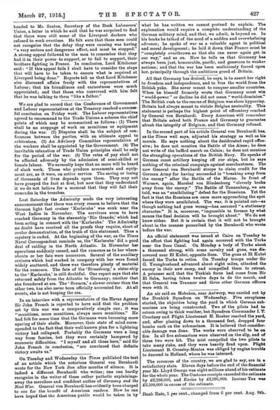In the second part of his article General von Bernhardi
haa, as the Times well says, adjusted his strategy as well as his morals. He says nothing about the desiderated rapid offen- sive; he does not mention the Battle of the Aisne ; he does not write of the baffled march on Calais; he does not mention the strangling operations of the British Navy. He speaks of German coast artillery keeping off our ships, but he says nothing of the criminal campaign against merchantmen. The new General von Bernhardi stoops to claim credit for the German Army for having succeeded in "breaking away from the enemy" after the Battle of the Marne. In front of Warsaw, again, Marshal von Hindenburg "cleverly broke away from the enemy." The Battle of Tannenberg, we are told, was an "annihilating" defeat for the Russians. Yet the fact is that the Russians are once more approaching the spot where they were annihilated. The war, it is pointed out—as though nothing had gone wrong—has assumed "a stationary character." It is, moreover, "impossible to foresee by what means the final decision will be brought about." We do not know either. But it is certain that it will not be brought about in the manner prescribed by the Bernhardi who wrote before the war.






































 Previous page
Previous page